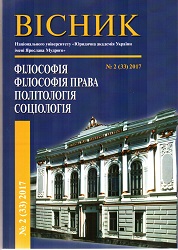ВСЕЛЕНСЬКЕ КАНОНІЧНЕ ПРАВО ПЕРШОГО ТИСЯЧОЛІТТЯ І ЦЕРКОВНЕ ПРАВО КИЇВСЬКОЇ РУСІ ХІ СТОЛІТТЯ: ПОРІВНЯЛЬНИЙ АНАЛІЗ
UNIVERSAL CANONICAL LAW OF THE FIRST MILLENNIUM AND KYIV RUS CANONICAL LAW OF THE XI-TH CENTURY: COMPARATIVE ANALYSIS
Author(s): О. V. ZinchenkoSubject(s): History of Law, Middle Ages, Canon Law / Church Law
Published by: Національний юридичний університет імені Ярослава Мудрого
Keywords: canonic law; Charter; Enumerical Council; Local Council; Statute;
Summary/Abstract: The article provides a comparative analysis of normativity accepted by Christian Enumerical Council and Local Council of IV–IX century and norms of Kyiv Rus canon law, in particular, the Prince Vladimir’s Charter and Prince Yaroslav’s Statute. The main attention is paid to the determination of the degree of Council decisions’ influence on designation and content of Prince’s documents as well as their common features and distinctions.The author comes to the conclusion that the introduction of canonic law in Kyiv Rus has been made under the influence of Byzantine church canons. Nevertheless, the above mentioned process and the essence of Russian canons are characterized by certain diversity. Eastern Church canonic law has been formed from the «bottom» within the period of nearly millennium at various Universal and Local Councils by Holy fathers and based on different sources and published in various collected works. Kyiv Rus canonic law has occurred «from above», supported by simultaneous publishing of Charter and Statute by two Princes that determined the sphere of the church jurisdiction quite clearly and precisely. The church, immediately after its introduction, was recognized as a special live orderliness while it had appeared in Rome only by the fourth century of its existence. Despite the fact that Nomocanon provided for different kinds of church hierarchs’ punishment by anathema, excommunication, deprivation of dignity as the result of numerous offences, the Charter and Statute didn’t contain such norms as well as punishment by damnation. The latter contained much more lenient punishment and provided for various monetary penalty ad- equate gravity of the offence. Within the battle with crimes against faith and church, the struggle for the morality of marriage and family relations and the observance of general Christian morality rules were highly emphasized. The Charter and Statute didn’t concern dogmatic issues; crime and punishment, provided for by these documents, were characterized by more peculiar specification and reflection of live realities. This way the church has influenced all legal aspects of Kyiv Rus society and formed original Russian canonic law. It manifested the Russian church deflection from the Greek one in its attitude towards modern secular society and state and formed the basis for its future development. In general the introduction of Christianity in Kyiv Rus meant the reception of the new Byzantine idea of law, which started to modernize all the aspects of society and state including political, legal, spiritual, cultural, ethical ones.
Journal: Вісник НЮУ імені Ярослава Мудрого. Серія: Філософія, філософія права, політологія, соціологія
- Issue Year: 33/2017
- Issue No: 2
- Page Range: 55-64
- Page Count: 10
- Language: Ukrainian

